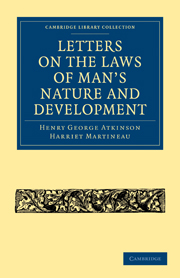Book contents
- Frontmatter
- Preface
- Mottoes
- Contents
- Letter. 1 Inquiry for a Basis
- Letter. 2 Proposal of a Basis
- Letter. 3 Preparation of the Ground
- Letter. 4 What is the Brain?
- Letter. 5 Inquiry about its Structure
- Letter. 6 Early days of Phrenology
- Letter. 7 Inquiry for New Discoveries
- Letter. 8 Methods of New Discovery. Organic Arrangement of the Brain
- Letter. 9 Illustrative Cases
- Letter. 10 Organic Arrangement of the Cerebrum
- Letter. 11 Dr. Howe's Report on Idiocy
- Letter. 12 The Senses and Nervous System
- Letter. 13 Illustrative Comment
- Letter. 14 Facts about the Senses under various conditions
- Letter. 15 Raising questions
- Letter. 16 Bacon, on Matter and Causation. Inferences and Dreams. Association of Ideas
- Letter. 17 Nothing
- Letter. 18 Knowledge and Notions. Results of each
- Letter. 19 Release from Notions. Entrance upon Knowledge
- Letter. 20 Natural History of Superstition
- Letter. 21 Theology and Science
- Letter. 22 Central Law and Pervasive Unity. Light. Sense of Identity. Ghost-seeing. Unrevealed Human Relations
- Letter. 23 Position and Privilege of Truth-seekers
- Letter. 24 Position and Privilege of Truth-speakers
- Appendix
Letter. 4 - What is the Brain?
Published online by Cambridge University Press: 29 August 2010
- Frontmatter
- Preface
- Mottoes
- Contents
- Letter. 1 Inquiry for a Basis
- Letter. 2 Proposal of a Basis
- Letter. 3 Preparation of the Ground
- Letter. 4 What is the Brain?
- Letter. 5 Inquiry about its Structure
- Letter. 6 Early days of Phrenology
- Letter. 7 Inquiry for New Discoveries
- Letter. 8 Methods of New Discovery. Organic Arrangement of the Brain
- Letter. 9 Illustrative Cases
- Letter. 10 Organic Arrangement of the Cerebrum
- Letter. 11 Dr. Howe's Report on Idiocy
- Letter. 12 The Senses and Nervous System
- Letter. 13 Illustrative Comment
- Letter. 14 Facts about the Senses under various conditions
- Letter. 15 Raising questions
- Letter. 16 Bacon, on Matter and Causation. Inferences and Dreams. Association of Ideas
- Letter. 17 Nothing
- Letter. 18 Knowledge and Notions. Results of each
- Letter. 19 Release from Notions. Entrance upon Knowledge
- Letter. 20 Natural History of Superstition
- Letter. 21 Theology and Science
- Letter. 22 Central Law and Pervasive Unity. Light. Sense of Identity. Ghost-seeing. Unrevealed Human Relations
- Letter. 23 Position and Privilege of Truth-seekers
- Letter. 24 Position and Privilege of Truth-speakers
- Appendix
Summary
H. G. A. to H. M.
I am glad to find that we agree so far. I will not make any comment on your last note, because I see you wish to proceed, at once, into the heart of the subject. Nor will I now detain you with observations on the nature of knowledge,—or the facts of organic chemistry, and some other matters which appear to me to be fundamental to the subject. Exactness of method does not greatly signify, in a matter so interlaced; where it is impossible to speak on any one point without, in some measure, assuming an acquaintance with some other department of the subject, or with some general notions only to be abstracted from the whole.
What I wish to indicate in the first place, then, is this:—that Man has his place in natural history: that his nature does not essentially differ from that of the lower animals: that he is but a fuller development and varied condition of the same fundamental nature or cause; of that which we contemplate as Matter, and its changes, relations, and properties. Mind is the consequence or product of the material man, its existence depending on the action of the brain. Mental Philosophy is, therefore, the physiology of the brain, as Gall termed it. Spurzheim called it Phrenology. Perhaps I might suggest Phreno-physiology, as a more comprehensive term.
- Type
- Chapter
- Information
- Letters on the Laws of Man's Nature and Development , pp. 16 - 24Publisher: Cambridge University PressPrint publication year: 2009First published in: 1851

